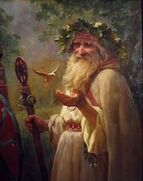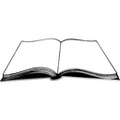Lord of Knowledge (Clan) and Lady of Learning (Crevan)
Areas of Concern:
Knowledge and learning. When feeling in an irreverent mood, scholars, who are dedicated to other gods, liken Crevan and Clan to a very old married couple who face the world together but are each set in his/her way and can be disrespectful towards the other one’s views. Clan is obsessive with collecting knowledge about everything and understanding how everything works. Only deserving people should share in that knowledge and he has little patience for dull thinking. He can also be a little detached from reality. Crevan, on the other hand, is very anchored in reality and believes knowledge is only good if it is useful and shared with others. Scholars and clerics who are dedicated to Clan and Crevan are not amused by this analogy as it clearly describes their priesthood and followers. Those people tend to be either Clan-like (pursue knowledge at any cost and somewhat isolated/insulated from the world) or are Crevan-like (can be avid teachers and/or ‘meddlers’ in world events). If a ruler has a priestly advisor, he/she is almost always of this domain and of the Crevan side… These advisors tend to be very well informed, extremely practical, forceful in promoting the ‘best way’ and, usually, right. Clerics of this domain concern themselves with depositories of knowledge, any center of learning (unless specialized for another domain), government in all aspects, and magic.
Duties of the Priesthood:
These clerics run the education system and are often advisors or in key government positions.
Thus, clerics of the justice/mercy domain are expected to:
1. Run the education system for general education (for example, reading and writing but not healing).
2. Educate, train, and monitor magic users. They carefully ensure magic users are working for the good of the realm and not become too controlling. Clerics of this realm have ensured that, with the exception of the Queen, no magic user (clerics exempted) is in a position of great power.
3. Gather, acquire, safeguard, and circulate knowledge.
4. Ensure the government runs smoothly and trains government officials for important posts (appointments subject to approval by the Council and the Monarchs).
Powers:
1. Clerics are able to cast “Detect Magical Aptitude” at will (to find those individuals who are able to be magic users). Note: This priesthood is one of the most influential in the Realm. An understated duty of the clerics of Justice and Mercy is to ensure the clerics of Knowledge and Learning do not become corrupt or too powerful in office. The cooperation and openness of the Knowledge and Learning trained government officials to this need with the lack of overall unity within the domain of Knowledge and Learning has helped to mollify the feelings of clerics of other domains…..
Cantrip: “Detect Magical Aptitude” Casting time: 1 action. Range: 5’ per level of caster. Components: Unlit candle. Duration: 1 minute per caster level. You may cast this spell to discover magical aptitude in an untrained magic user (trained magic users can mask their aptitude with an act of will). The caster will have a general idea of possible candidates within the spell range. To confirm, the caster has the candidate hold a candle and the caster puts his/her hand over the candidate’s hand holding the candle. The candidate, to make it easier, closes his/her eyes and concentrates of visualizing a flame on the candle’s wick. A candidate who can be trained as a magic user will then cause the candle to light. A candidate may choose to try to conceal his/her aptitude or may be distracted, etc. and unable to concentrate. In that case, it is a contest of the candidate’s intelligence versus the caster’s intelligence. The caster gets a positive modifier equal to his/her level. The DM may adjust for circumstances (the positive modifier will be less in a stressful situation). This spell only indicates magical aptitude, it gives no training. Also, the higher the caster level, the more chance he/she has to identify how powerful the candidate’s potential is…..
Knowledge and learning. When feeling in an irreverent mood, scholars, who are dedicated to other gods, liken Crevan and Clan to a very old married couple who face the world together but are each set in his/her way and can be disrespectful towards the other one’s views. Clan is obsessive with collecting knowledge about everything and understanding how everything works. Only deserving people should share in that knowledge and he has little patience for dull thinking. He can also be a little detached from reality. Crevan, on the other hand, is very anchored in reality and believes knowledge is only good if it is useful and shared with others. Scholars and clerics who are dedicated to Clan and Crevan are not amused by this analogy as it clearly describes their priesthood and followers. Those people tend to be either Clan-like (pursue knowledge at any cost and somewhat isolated/insulated from the world) or are Crevan-like (can be avid teachers and/or ‘meddlers’ in world events). If a ruler has a priestly advisor, he/she is almost always of this domain and of the Crevan side… These advisors tend to be very well informed, extremely practical, forceful in promoting the ‘best way’ and, usually, right. Clerics of this domain concern themselves with depositories of knowledge, any center of learning (unless specialized for another domain), government in all aspects, and magic.
Duties of the Priesthood:
These clerics run the education system and are often advisors or in key government positions.
Thus, clerics of the justice/mercy domain are expected to:
1. Run the education system for general education (for example, reading and writing but not healing).
2. Educate, train, and monitor magic users. They carefully ensure magic users are working for the good of the realm and not become too controlling. Clerics of this realm have ensured that, with the exception of the Queen, no magic user (clerics exempted) is in a position of great power.
3. Gather, acquire, safeguard, and circulate knowledge.
4. Ensure the government runs smoothly and trains government officials for important posts (appointments subject to approval by the Council and the Monarchs).
Powers:
1. Clerics are able to cast “Detect Magical Aptitude” at will (to find those individuals who are able to be magic users). Note: This priesthood is one of the most influential in the Realm. An understated duty of the clerics of Justice and Mercy is to ensure the clerics of Knowledge and Learning do not become corrupt or too powerful in office. The cooperation and openness of the Knowledge and Learning trained government officials to this need with the lack of overall unity within the domain of Knowledge and Learning has helped to mollify the feelings of clerics of other domains…..
Cantrip: “Detect Magical Aptitude” Casting time: 1 action. Range: 5’ per level of caster. Components: Unlit candle. Duration: 1 minute per caster level. You may cast this spell to discover magical aptitude in an untrained magic user (trained magic users can mask their aptitude with an act of will). The caster will have a general idea of possible candidates within the spell range. To confirm, the caster has the candidate hold a candle and the caster puts his/her hand over the candidate’s hand holding the candle. The candidate, to make it easier, closes his/her eyes and concentrates of visualizing a flame on the candle’s wick. A candidate who can be trained as a magic user will then cause the candle to light. A candidate may choose to try to conceal his/her aptitude or may be distracted, etc. and unable to concentrate. In that case, it is a contest of the candidate’s intelligence versus the caster’s intelligence. The caster gets a positive modifier equal to his/her level. The DM may adjust for circumstances (the positive modifier will be less in a stressful situation). This spell only indicates magical aptitude, it gives no training. Also, the higher the caster level, the more chance he/she has to identify how powerful the candidate’s potential is…..



